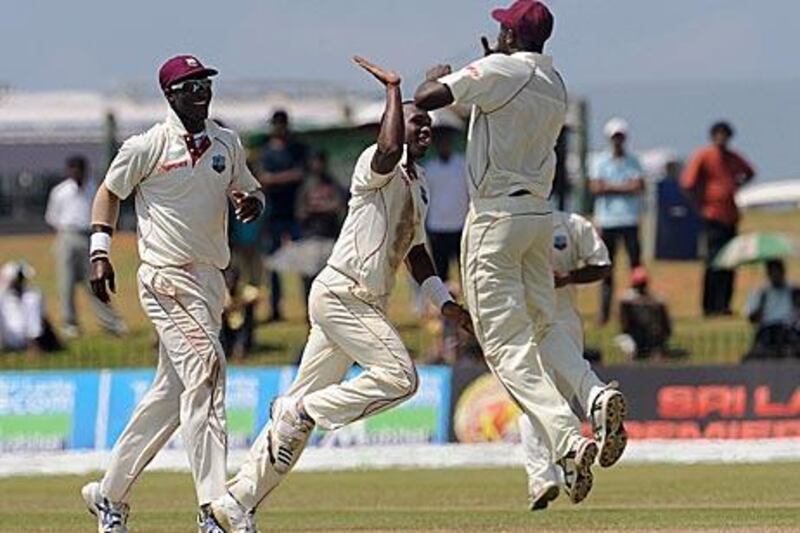The day I left Barbados after the World Cup final in 2007, Hallam, who had driven me around the island for much of the previous two weeks, arrived early.
Seeing that I was ready, he insisted that we leave for the airport well before time. "Something I want to show you," he said cryptically.
He took me to the graveyard of the St Bartholomew church. "You cannot leave without paying your respects to Maco," he said solemnly.
Hallam was right, of course. For a brown kid who grew up watching the all-conquering heroes of the 1980s, Malcolm Marshall was so much more than just a fast bowler.
In the decade after Marshall's death in 1999, the legacy that he helped create has taken a beating. In 51 overseas Tests going back 10 years, West Indies have won just five and lost 35. Only one of those successes, against South Africa at Port Elizabeth in December 2007, has come against a top side.
Before we parted ways, I asked Hallam: "Do you think it will ever be like it was?" He replied with a smile. "Circle of life, man," he said. "We won't stay down forever."
Over the past four days in Galle, the touching faith of fans like him has been justified by the sort of performance that has seldom been seen in recent times. No corner has yet been turned and no new dawn has been glimpsed, but a bunch of cricketers from different islands and Guyana are finally looking like a team again.
As their fortunes have declined, it is become almost the default position to blame an indisciplined new generation for all that ails Caribbean cricket. After the release of Fire in Babylon, the documentary about the glory years, Michael Holding told me: "It makes me feel great to know that so many still think of us. I can't see those days coming back with the mess we've got now for a board and the inept players' association that has no regard for the game, but only the benefits that come with playing."
While the players' body hasn't endeared itself with all sorts of brinkmanship, the real rot begins at the top. In his autobiography, Sir Vivian Richards writes: "Despite the way I have been treated I will never turn my back on West Indies cricket because it gave me a hell of a lot, and it just burns me up that sport is being run by a bunch of duffers.
"It is sad that the lowest achievers want the biggest jobs when they retire. … You don't just pick a side and tell them what their individual jobs are; they have to be aware of their responsibilities towards the whole team and know what is the common goal."
For all his batting ability, Chris Gayle, so laid-back, was not the right man to lead the team. Darren Sammy has nothing like the same talent, but having come from the backwater that is St Lucia, he seems better aware of what it means to "rally around the West Indies".
There are no Marshalls or Holdings in this squad, and Gayle is no Richards, either. But that shouldn't matter as long as they look out for each other. "We didn't know when we were beaten," Clive Lloyd said in Fire in Babylon, while Gordon Greenidge speaks of how "our cricket spoke for us".
But to really move forward, West Indies cricket must come to terms with its past. "No other sporting team in any discipline, anywhere in the world, dominated their sport for 15 years," Holding said. Not Vince Lombardi's Packers, not Jock Stein's Celtic and not the Australia cricket team of the 1990s and 2000s.
Given the relative shallow player pool and the fact that cricket competes for attention with athletics, football, and a variety of American sports, it is too much to expect that once-in-a-lifetime dominance again. But what West Indies cricket can do is put a proper structure in place so that the lows of the past decade are not repeated.
The Indian Premier League will help to an extent. With the West Indies board unable to match the salaries that other countries can afford to pay their players, the IPL income keeps the best players happy. In return for the board guaranteeing an IPL window, perhaps the league could pay it a certain amount for releasing the players.
The ICC can also do its part. It's all very well taking cricket to the United States or China, or encouraging its growth in Afghanistan. But it's far more vital that it remains in good health in its heartlands, in the Caribbean and Pakistan, where fortunes have been at a low ebb.
As for Fire in Babylon, watch it as soon as you can. As Richards said, "It is history that you will never forget." Folks like Hallam certainly haven't, and neither have the players who were part of it.
"The memories are fading," Colin Croft said, "but a few of us try to keep them alive."





